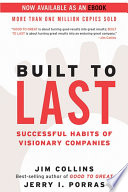

The authors, Jim Collins and Jerry Porras, distinguish between visionary companies, which are built to last, and comparison companies, which are merely average. Visionary companies have a core ideology that transcends their products and services. They are driven by a purpose beyond just making money. This core ideology is rooted in a set of values and a mission that guides their decision-making and strategy. Comparison companies, on the other hand, often lack this strong foundation and tend to focus solely on short-term profits. The authors argue that visionary companies create a lasting impact because they are committed to their core principles and adapt to changing circumstances while staying true to their mission.
Continue readingOne of the central tenets of the book is the concept of 'preserving the core and stimulating progress.' Visionary companies maintain a strong commitment to their core values and mission while simultaneously embracing change and innovation. This duality allows them to remain relevant and competitive in a rapidly changing marketplace. The authors emphasize that companies should not compromise their core values in pursuit of growth or profitability. Instead, they should find ways to innovate and adapt while staying true to their foundational beliefs. This principle is crucial for long-term success and sustainability.
Continue readingThe concept of Big Hairy Audacious Goals (BHAGs) is introduced as a way for visionary companies to inspire and motivate their employees. BHAGs are bold, ambitious goals that serve as a rallying point for the organization. They are meant to be challenging and require significant effort and innovation to achieve. The authors argue that having a BHAG creates a sense of purpose and direction, encouraging employees to push beyond their limits. Visionary companies often use BHAGs to foster a culture of excellence and to drive progress, which ultimately contributes to their enduring success.
Continue readingVisionary companies often develop what the authors describe as 'cult-like cultures.' These are strong, cohesive organizational cultures that are deeply rooted in the company's core values and beliefs. Employees in these organizations are highly engaged and share a sense of belonging and commitment to the company's mission. The authors point out that these cultures are not merely about having fun or being informal; they are about a strong alignment with the company's purpose and values. This alignment fosters loyalty and motivates employees to go above and beyond in their work, contributing to the company's long-term success.
Continue readingEffective leadership is a crucial factor in the success of visionary companies. The authors highlight that leaders in these organizations are not just focused on achieving short-term results but are also committed to building a lasting legacy. They prioritize the development of their employees and the cultivation of the company culture. Leaders in visionary companies are often described as 'level 5 leaders,' a term coined by Collins in his previous work. These leaders possess a unique blend of humility and professional will, allowing them to inspire their teams and make decisions that benefit the organization in the long run.
Continue readingVisionary companies understand the importance of continuous innovation in maintaining their competitive edge. The authors argue that these companies do not rest on their laurels; instead, they actively seek out new opportunities for growth and improvement. They invest in research and development and encourage a culture of experimentation and learning. This commitment to innovation enables them to adapt to changing market conditions and stay ahead of competitors. The authors emphasize that innovation should be aligned with the company's core values and mission to ensure that it contributes to the overall purpose of the organization.
Continue readingA strong brand is a key asset for visionary companies. The authors discuss how these companies invest in building a recognizable and respected brand that reflects their core values and mission. A strong brand not only attracts customers but also helps to retain employees who are proud to be associated with a reputable organization. Visionary companies understand that their brand is a reflection of their identity and culture, and they work diligently to maintain and enhance it. This focus on branding contributes to their long-term success and ability to weather challenges.
Continue readingThe reading time for Built to Last depends on the reader's pace. However, this concise book summary covers the 7 key ideas from Built to Last, allowing you to quickly understand the main concepts, insights, and practical applications in around 21 min.
Built to Last is definitely worth reading. The book covers essential topics including Visionary Companies vs. Comparison Companies, Preserve the Core and Stimulate Progress, Big Hairy Audacious Goals (BHAGs), providing practical insights and actionable advice. Whether you read the full book or our concise summary, Built to Last delivers valuable knowledge that can help you improve your understanding and apply these concepts in your personal or professional life.
Built to Last was written by Jerry I. Porras, Jim Collins.
If you enjoyed Built to Last by Jerry I. Porras, Jim Collins and want to explore similar topics or deepen your understanding, we highly recommend these related book summaries:
These books cover related themes, complementary concepts, and will help you build upon the knowledge gained from Built to Last. Each of these summaries provides concise insights that can further enhance your understanding and practical application of the ideas presented in Built to Last.